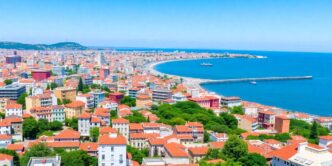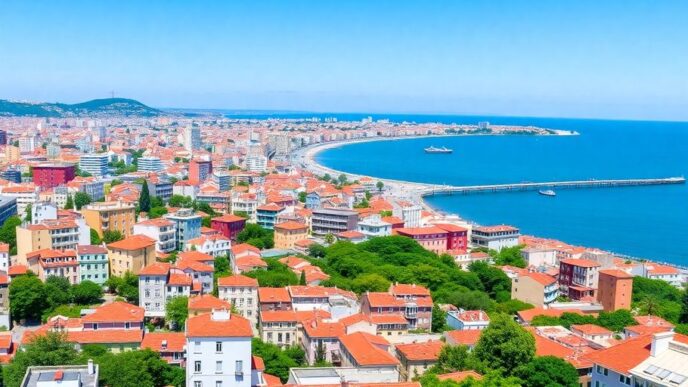Navigating Legalities and Maximizing Benefits

Understanding Portugal’s Digital Nomad Visa
Portugal introduced the Digital Nomad Visa in 2022, catering to remote workers, freelancers, and business owners who desire to live and work in Portugal. This visa allows for a stay of up to 12 months, extendable to five years. To be eligible, applicants must meet certain criteria.
Eligibility for the Digital Nomad Visa requires:
- Working remotely with income sourced from outside Portugal.
- Earning at least four times the Portuguese minimum wage (approximately $2,750 per month).
- Opening a local bank account to manage Portuguese taxes.
- Providing proof of work, health insurance, and accommodation for 12 months.
- Undergoing a background check among other requirements.
Since its launch, the visa has seen significant interest, with over 200 visas granted in the first two and a half months, predominantly to applicants from Brazil, the UK, and the USA. The visa also offers a reduced tax rate of 15%, compared to the standard 25% in Portugal.
Leveraging the Non-Habitual Residency (NHR) Tax Program
Portugal’s Non-Habitual Residency (NHR) program was a lucrative option for digital nomads seeking tax benefits. By establishing tax residency in Portugal, eligible individuals can enjoy reduced tax rates and exemptions for a period of ten years. The program specifically targets foreign income, offering a favourable tax treatment that can lead to significant savings.
The NHR program included various tax perks such as:
- Exemption from taxation on certain foreign-sourced income
- A flat 20% tax rate for certain Portuguese-sourced income
- No inheritance or gift tax on assets outside of Portugal
However, the last government, led by Antonio Costa changed the regulations and the NHR rules are significantly different now. The new regime focuses on employment, primarily scientific research, and innovation, and no longer benefits retirees and other high-value jobs, where workers ‘based’ themselves in Portugal.
Consulting a Portuguese accountant or tax advisor is the best way of checking if you could be eligible for the new scheme. You could be eligible to be ‘grandfathered’ in to the old scheme, under some conditions, or you may be eligible for the new scheme.
Complying with Local Laws and Regulations
In Portugal, digital nomads must navigate a series of legal requirements to ensure full compliance with local laws. Initially, it is imperative to register with the tax authorities and Social Security. This involves obtaining a NIF (fiscal number) and a NISS (Social Security number), which are essential for legal and financial transactions.
For those engaging in regulated activities, securing the appropriate business permits or licenses is a crucial step. The choice between a simplified regime and organized accountancy will dictate the management of accounting needs. Professional Indemnity Insurance is also recommended to protect against potential liabilities.
Understanding and adhering to visa and residence requirements is another key aspect of legal compliance. Digital nomads should stay informed about the latest visa regulations, work permits, and tax obligations to avoid any legal pitfalls. By doing so diligently, freelancers can position themselves to leverage Portugal’s unique benefits for long-term success.
Optimising the Digital Nomad Experience in Portugal

Selecting the Ideal Portuguese Location for Remote Work
Portugal offers a variety of locations that cater to the needs of digital nomads and remote workers. The capital, Lisbon, stands out as a vibrant hub with a rich cultural scene and a plethora of amenities tailored to those who work remotely. It’s not just the capital that’s appealing; major cities like Porto and regions such as the Algarve are also equipped with an abundance of co-working spaces and qualified offices designed to foster productivity and provide a comfortable working environment.
When considering where to settle, remote workers should weigh factors such as the cost of living, internet connectivity, and the availability of leisure activities. Portugal’s reputation as a top destination for digital nomads was cemented when it ranked as the world’s best country for remote work in 2022, according to the Work from Wherever Index by Kayak. This accolade is a testament to the country’s accessibility for remote workers, excellent weather, safety, and high English proficiency.
Moreover, Portugal leads in sustainable architecture, reducing the carbon footprint, and setting international standards for sustainability. This commitment to green urban development and economic growth makes it an even more attractive destination for those who value environmental consciousness in their lifestyle choices.
Mastering Timezone Differences for Global Collaboration
Mastering timezone differences is crucial for digital nomads in Portugal, especially when collaborating with global teams. Utilizing tools like World Time Buddy can be invaluable for scheduling and staying in sync with clients and colleagues across various time zones.
Effective communication about your working hours is essential to set clear expectations and alleviate the stress of coordinating meetings. Adopting an asynchronous work model allows for greater flexibility, enabling you to work during your most productive hours while also enjoying the local culture.
- Align your sleep schedule with the time zones of your primary clients to minimize disruptions.
- Use scheduling tools to keep track of different time zones and plan meetings accordingly.
- Communicate your availability clearly to your team and clients to ensure smooth collaboration.
Portugal’s strategic location offers an advantage for digital nomads serving a global clientele, bridging the gap between Asian and American time zones. This positioning can make it easier to interact with clients from various regions within a reasonable working day.
Adapting to the Digital Nomad Etiquette in Public Spaces
When embracing the digital nomad lifestyle in Portugal, understanding and adapting to local etiquette in public spaces is crucial for a harmonious experience. Public areas such as cafes, co-working spaces, and libraries are common workplaces for digital nomads. It is essential to respect these spaces and adhere to certain unspoken rules to maintain a positive environment for everyone.
- Respect the Space: Always be mindful of the noise level and space you occupy. Use headphones when listening to music or during video calls.
- Purchase Policy: Support the establishment by purchasing items periodically if you plan to stay for an extended period.
- Power Usage: Be considerate of power outlet usage; avoid monopolizing outlets and have your devices charged beforehand if possible.
- Data Security: Practice good cybersecurity habits, such as using VPNs and not leaving devices unattended.
By following these guidelines, digital nomads can contribute to a respectful and productive atmosphere. For a more comprehensive guide to living in Porto as a digital nomad, including coworking spaces, cafes, cost of living, and finding accommodation, refer to resources like the “Digital Nomad Guide to Living in Porto, Portugal – Goats On The Road“.













